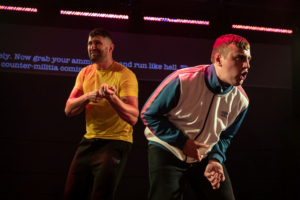Guest Blog: Playwright Alice Malseed On JADE CITY at The Bunker

Belfast is a beautiful and mad little place. At the weekends it buzzes with energy. People here are doing fantastic things. There are big groups of people saying "Y'know what, the Government aren't helping this place to change, so we'll have to do it ourselves".
This is why we're FINALLY going to have Equal Marriage and Abortion Rights on 21 October this year. People here have an ability to create bonds and community like nowhere else.
The physical landscape of Belfast is impressive and oppressive. The city is surrounded by hills, beneath which are mills, tower blocks, cranes, building projects, shopping centres, housing estates, mansions, a shipyard, and docks.
These things are all vessels for ghosts: the ghosts of the boom time when the linen and shipbuilding industries were huge employers; then the ghosts of the ships, of those who've left for a better life elsewhere; and the tower blocks bringing the ghosts of the British army and the Troubles. The river and Cave Hill bring ghosts too - those who've taken their own lives.
.jpg)
People in Belfast want to live, to be, to feel, to experience and imagine. The only problem is, successive local and national governments have gone out of their way to make this universally impossible for decades.
The same governments are quick to supply and endorse a climate and culture that oppresses working-class individuals further, dehumanising them through poverty wages, inadequate housing, benefit reform and the allowance of oppressive work practices.
Jade City is a response to all this. It's a story about Sas and Monty, two men who want to live, but whose circumstances prevent it. It's about a desire to escape, and to tap into that childhood playfulness and feeling of hope.
I wrote Jade City because I moved house into a new area. This new neighbourhood felt so heavy. Everything looked grotty and shit. The house physically smelt like shit and the drains were overflowing with it. The proximity of the houses and the narrowness of the street meant that there were people everywhere, bright orange hair, vibrant orange and blue WKD, and a chocolate Labrador shitting all over the street.
It was a very hot dry June. Everything was amped up in this heat. I could physically feel a lack in the air - a lack of opportunity of money, of activity, of hope. People's posture and physicality fascinated me; everything seemed so jaded, so worn down. This house is where I wrote the play.
%20(3).jpg)
I was an observer in this world. I always have been - that's why I write.
Jade City is also a play about rape. The whole plot is anchored by the moral position that the observer takes in an act of sexual violence against another person.
Men who are rapists and who commit sexual assault walk among us. They're not all monsters. They work in our buildings, they share our tables at lunchtime, they're in our gym classes, they're behind us in the queue for the bus, they're in our WhatsApp groups, they like our Instagram posts.
Do you know any lads who admit they have raped women? Nah, unlikely. Do you know any women who talk about their rape, sexual assault, or non-consensual sexual experience? 100%, you do.
We still can't confront the males in our world who do these awful things. So instead, we talk about the women, further embedding and re-enacting their trauma by discussing their look, their actions, their clothes, their worlds.
I wrote this play as a conversation about why men rape women. I feel sick thinking about it, actually. Jade City is a blast, a whirlwind, a punch in the face, a deconstruction of toxic masculinity and of Belfast today. It's dark and deep and, in some twisted way, darkly funny and great craic. This is Belfast. This is truth. This is Sas and Monty's world.
Jade City at The Bunker until 21 September
Photo credit: Ali Wright
Comments
Videos

